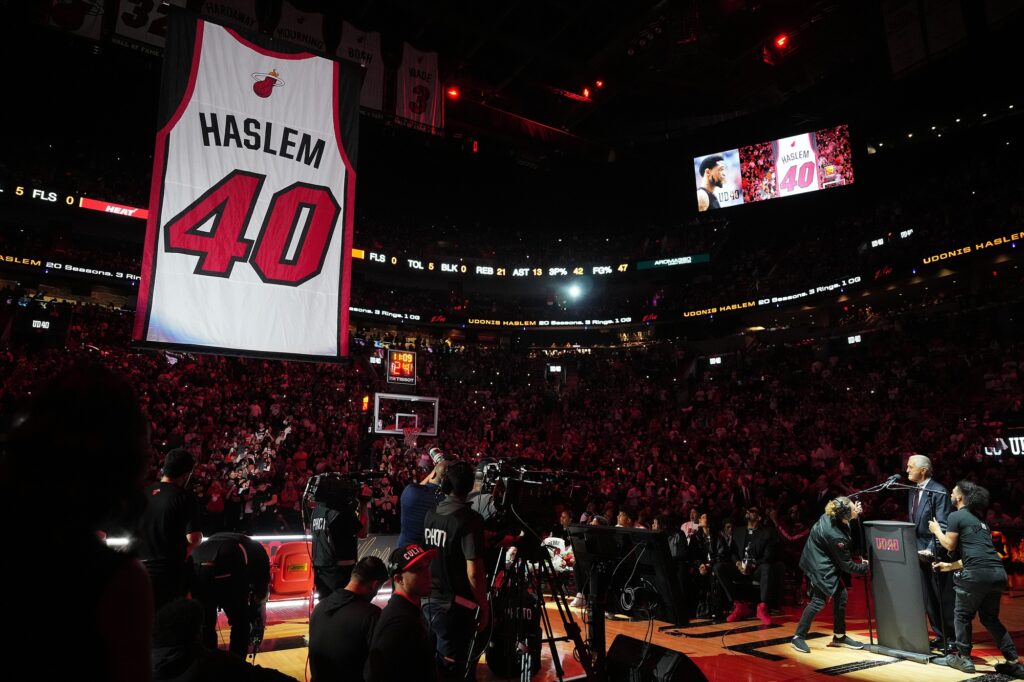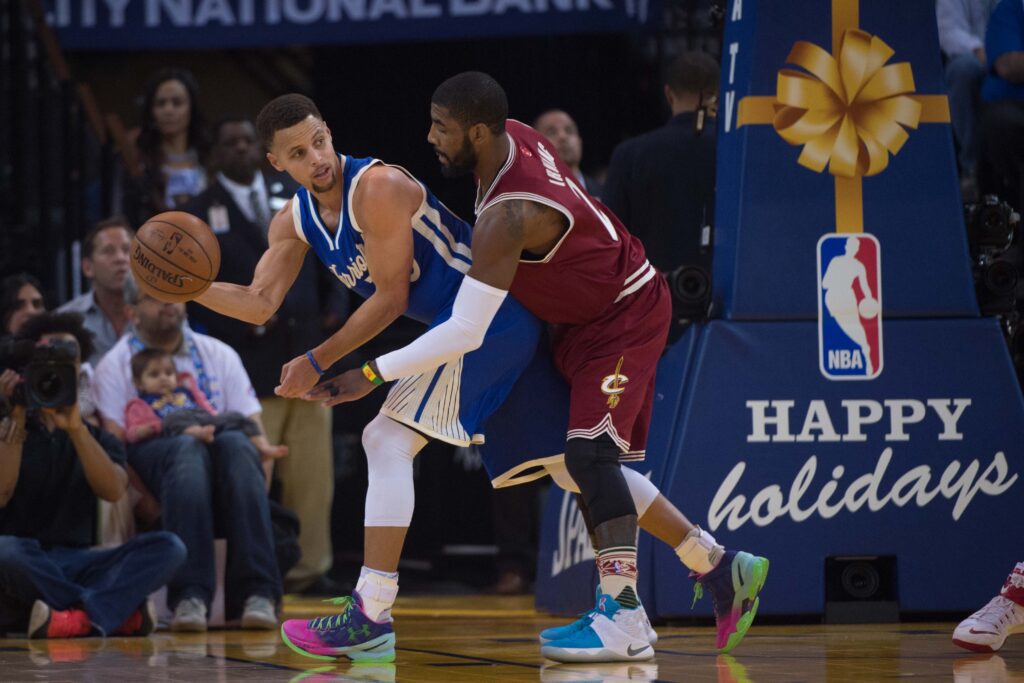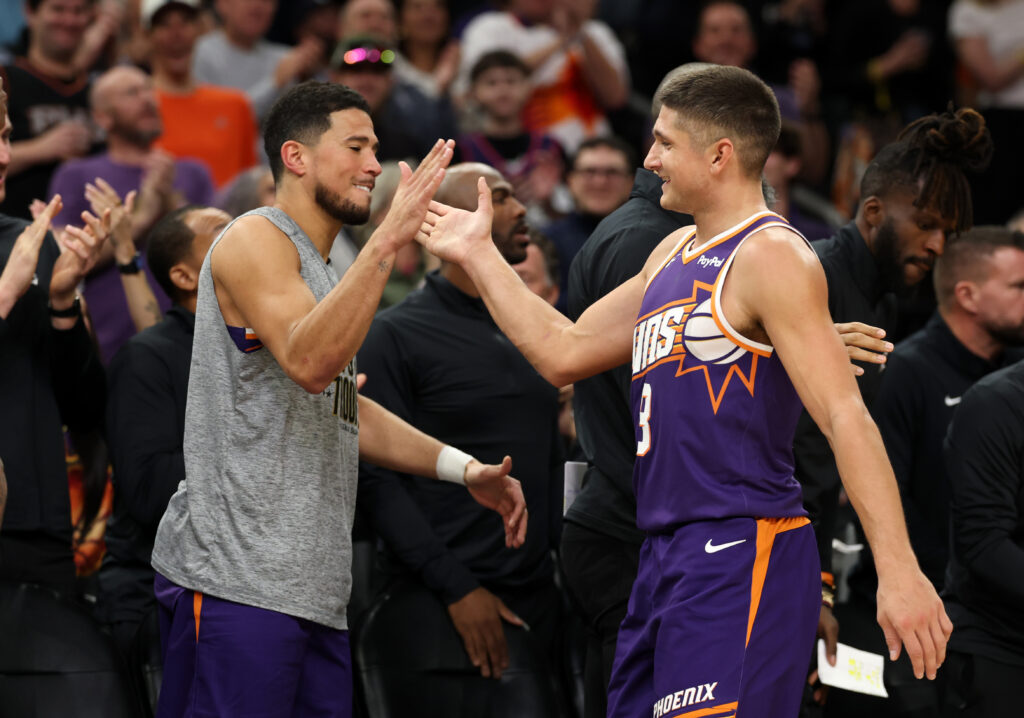The recent announcement of the Orlando Magic retiring Shaquille O’Neal‘s jersey after a prolonged delay raises questions about the franchise’s handling of iconic player honors. Shaq becomes the first Orlando Magic player to receive this recognition, highlighting a notable gap in acknowledging the team’s historical stars.
This situation, coupled with the ongoing debate surrounding Carmelo Anthony‘s and Nikola Jokic‘s jersey numbers, prompts reflection on other NBA franchises that have controversially reassigned jersey numbers once worn by their star players.
In Shaq’s case, the Orlando Magic retired the number 32 jersey, but it had been previously assigned to C.J. Watson. This unique scenario sets Shaquille O’Neal apart as the only player on this list who had another player wear their jersey before it was retired. It’s one thing not to retire a franchise star’s number, but it’s another thing entirely to give that number away to just anyone. It’s pure disrespect, and typically, there are underlying circumstances that can offer explanations for the decision.
From Icons to Afterthoughts: Jersey Retirements in the NBA
Tracy McGrady, Orlando Magic
T-Mac’s stint in Orlando could have been much smoother. The franchise had a golden opportunity to acquire Tim Duncan, and with McGrady and Grant Hill, they could have dominated the Eastern Conference for an extended period. Unfortunately, the Magic missed out on Duncan, and Hill’s superstardom was derailed by injuries.
Consequently, McGrady found himself spending prime years on struggling teams after four stagnant seasons with the Magic. Frustrated, the scoring champ informed the organization that he wouldn’t be re-signing once his option became available.
Adding to his discontent, McGrady felt unwanted within the organization, receiving no phone calls or visits to persuade him to stay. It seemed as though the Magic had little interest in retaining T-Mac, and he willingly departed. However, his final season with the Magic was challenging, with a mere 21 wins, and McGrady’s nightly efforts were questioned—a less-than-ideal exit.
Despite contributing some of his best years to Orlando, the Magic swiftly assigned McGrady’s coveted number 1 to Doug Christie. Christie spent just one season with the Magic, averaging a modest 5.7 points per game.
Rajon Rondo, Boston Celtics
It’s surreal to think about a period when Rajon Rondo seemed destined to be a lifelong Celtic, reminiscent of Paul Pierce‘s enduring presence. He played a pivotal role in elevating the Celtics’ big three—Pierce, Ray Allen, and Kevin Garnett—toward a big four around 2011, seizing an opportunity to showcase his value on an aging roster.
However, with the departure of the big three to the Brooklyn Nets, Rondo’s time as a Celtic abruptly ended just two seasons into the experiment. This meant Rondo had little individual narrative as a Celtic. Unsurprisingly, given the Boston Celtics’ rich history with 24 retired numbers, Rondo did not meet the criteria for jersey retirement.
Shortly after Rondo’s exit, Demetrius Jackson, a player who participated in just five games and averaged two points per game, inherited Rondo’s number nine. Subsequent players like Jarell Eddie, Xavier Silas, and Brad Wanamaker wore the number, with Derrick White being the most recent, though he doesn’t fall into the category of subpar players.
In contrast to McGrady’s contentious departure from the Magic, Rondo’s exit marked a necessary transition for a rebuilding phase. At the time of the trade, there were no apparent hard feelings or accusations of quitting or disrupting the locker room. Stories about his teammate dynamics and the feud with Ray Allen surfaced much later.
During his tenure, Rondo earned recognition as a top point guard, contributed to a championship, and played a significant role in a cherished era of Boston basketball. Despite these accomplishments, the brevity of his time and the need for a longer tenure may have played a role in not securing the honor of jersey retirement.
Ray Allen, Boston Celtics
Ray Allen played a crucial role in restoring Boston’s relevance, marking a significant era since the 80s. He was a key part of the big three and showcased a performance worthy of contending for a Finals MVP in 2008. While Kevin Garnett and Paul Pierce had their jerseys retired promptly, Allen didn’t receive the same level of recognition.
Boston swiftly reassigned Allen’s number when the need arose to acquire a big free agent, albeit with some delay and consideration given the notable name. The straightforward explanation is Ray Allen’s move to the Miami Heat, a fierce rival of the Celtics, particularly after LeBron James joined Miami. This decision, coming after two consecutive losses to James in the playoffs, stirred controversy and eliminated any debate about Allen’s contributions or tenure with Boston. Allen would likely have seen his jersey retired by now without this move.
Despite Danny Ainge stating that jersey retirement decisions lie with ownership, and a decision has been made for the time being, uncertainties remain. Gordon Hayward, who wore Allen’s number 20, didn’t achieve enough to warrant jersey retirement. The future remains unclear, and only time will tell what decisions are made down the road.
Dwight Howard, Orlando Magic
The conclusion of Dwight Howard‘s time in Disneyland was a perplexing period to witness. Initially, there were reports indicating his desire to stay with the organization, followed by rumors of potentially teaming up with Chris Paul. To add to the complexity, there were ultimatums from the front office regarding his contract extension. Howard later revealed that his trade request was exposed by the front office, as he had only notified the GM of the Magic.
In essence, Howard’s last year with the Magic was marked by extreme confusion, exacerbated when it concluded with back surgery just before the playoffs, preventing his participation. The ensuing allegations of quitting tarnished Howard’s reputation, a decline that continued even after his departure from Orlando.
The less-than-stellar conclusion left both parties with a bitter taste, symbolized by the swift reassignment of the jersey of the man who led the Magic to their second NBA Finals appearance in franchise history, worn by Tobias Harris just a year removed from Howard’s departure. Given the recent events in Howard’s life, the likelihood of the Magic retiring his jersey appears improbable.
Kevin Durant, Oklahoma City Thunder
OKC may never forgive Kevin Durant for his actions eight years ago. It’s hard to explain to younger fans just how beloved Durant was around the league pre-2016. He was literally the good guy, and for OKC, he was the franchise. Teaming up with Westbrook after the franchise moved from Seattle, they swiftly propelled the team into contention within a few seasons.
However, after a series of unfortunate events and some disappointing playoff performances, Durant made a move that echoed LeBron’s decision in 2010 and Ray Allen’s move in 2012, albeit on a grander scale. Durant’s decision to join the Golden State Warriors following their record-setting 73-9 season was met with disapproval from virtually everyone outside of Golden State. In response, the Thunder promptly reassigned Durant’s number 35 to PJ Dozier in 2018.
Notably, none of the players who lost their jerseys in similar circumstances have gone on to have them retired. Despite this, Durant expressed in a 2022 interview that he believes the Thunder should retire his jersey, stating that not doing so would be detrimental to the game of basketball.
Considering that only one other player briefly wore Durant’s number for a single season, the organization’s decision may have been impulsive, reflecting the freshness of the wounds. There remains a chance for reconciliation, especially if Durant concludes his career with the franchise, providing an opportunity for his jersey to be retired in the future.
Carmelo Anthony, Denver Nuggets
This situation is intriguing because Carmelo Anthony once served as the face of the Denver franchise. However, it’s evident that he won’t be honored with the jersey retirement, primarily because Nikola Jokic achieved what Anthony couldn’t: bringing a championship to the city of Denver.
Anthony’s departure from Denver paralleled T-Mac’s situation—trade me or get nothing in return. Unlike McGrady, Anthony had recently reached the conference finals with a genuine chance of going all the way. He said the front office’s subsequent actions signaled a total rebuild. They let Dontae’ Jones go, refused to re-sign Chauncey Billups, and contemplated trading J.R. Smith and Kenyon Martin. Consequently, Anthony, having spent seven years in the league, expressed his reluctance to stick around for a rebuild despite not wanting to leave Denver.
His lack of trust in the organization’s championship aspirations was candidly shared with the media, reminiscent of James Harden‘s departure from Houston. Following these revelations, Anthony’s time with Denver came to an end.
It might seem straightforward that a superior player followed Anthony, delivering the championship he couldn’t. However, by 2013, Anthony’s number 15 was worn by Anthony Randolph, who averaged a mere 4.3 points per game with the Nuggets and retired after just two years with the team. When the Nuggets again let go of number 15, it was assigned to second-round draft pick Jokic, a move perhaps unexpected given Jokic’s early career.
The notable point is that Denver lent Anthony’s jersey to, at the time, unremarkable names twice, signifying deliberate disrespect from the franchise in assigning the number without due consideration.
Vince Carter, Toronto Raptors
Interestingly, the inspiration for this article didn’t stem from this, but Austin Rivers recently voiced his opinion on the apparent disrespect by Toronto for not retiring Vince Carter‘s number, and he makes a valid point.
Vince Carter played a pivotal role in transforming the perception of basketball in Canada, inspiring numerous current NBA players. He is an iconic figure in the purple and black uniforms, leaving an indelible mark on the Raptors.
Regrettably, much like McGrady and Anthony, a simple trade request disrupted everything. Fanbases typically don’t take it lightly when a star player expresses a desire to leave. Additionally, the city that held Carter in high regard felt he quit near the end of his tenure with the Raptors.
Carter himself played a significant role in this narrative by publicly admitting to not giving his full effort to the team, a sentiment that became evident after his trade. In the 20 games before the trade, Carter averaged 15.9 points per game on 41% shooting from the field and 32.2% shooting from three. In the subsequent 57 games with the New Jersey Nets, his averages soared to 27.5 points per game, 46.2% shooting from the field, and 42.5% shooting from three.
While there appears to have been some reconciliation over the years since his departure, the fact that the Raptors assigned Carter’s number 15 to Jorge Garbajosa in 2006 remains questionable. Subsequent players like Amir Johnson, Anthony Bennett, Eric Moreland, and Greg Monroe also wore the number 15 for the Raptors, which raises concerns about the significance of retiring Carter’s jersey.
Main Image: Jasen Vinlove-USA TODAY Sports



